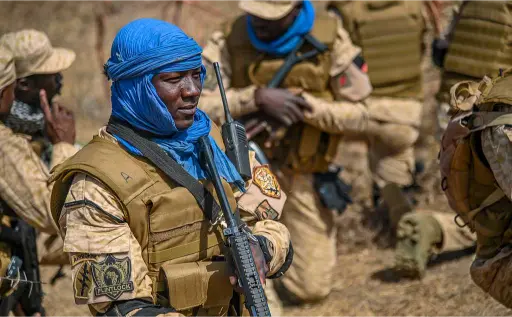Human Rights Watch has reported a severe incident in Burkina Faso where the military is alleged to have executed 223 civilians, including 56 children, in one day in late February.
This incident, part of a broader military effort to combat jihadist violence, occurred shortly after Russian troops arrived in the country to bolster security. The massacre took place in Soro and Nondin villages in northern Yatenga province, with 179 and 44 people killed respectively. This tragedy may constitute crimes against humanity, prompting calls for an urgent UN-backed investigation.
Burkina Faso has suspended the BBC and Voice of America (VOA) radio networks from broadcasting for two weeks over their coverage of a report accusing the army of the extrajudicial killings of civilians, the authorities said.
The West African country is run by a military government led by Captain Ibrahim Traore who seized power in a coup in Sep. 2022, eight months after an earlier military coup had overthrown the democratically elected President Roch Marc Kabore.
Civilians have been caught in the crossfire as violence has escalated between the army and armed groups linked to al-Qaeda and ISIL (ISIS). The country’s military leaders have cut ties with former colonial ruler France and turned to Russia for security support.
The context of these events includes a regional conference on terrorism that Burkina Faso did not attend, and a shifting U.S. counter-terrorism strategy in the region, with Burkina Faso increasingly looking to Russia for security support.
Burkina Faso is currently facing a multitude of challenges, including political instability, security crises, and humanitarian issues.
The country has experienced significant political turmoil, marked by coups and changes in leadership. Most recently, the military took control, citing failures by the previous government to handle the security situation and unite the country.
Burkina Faso has been struggling with escalating violence from armed groups linked to both ISIL (ISIS) and al-Qaeda. These groups have been responsible for a series of attacks that have killed thousands and displaced over a million people. The violence has severely impacted civilian life and led to widespread human rights abuses.
The ongoing conflict and violence have led to a significant humanitarian crisis. More than 3.5 million people are in need of humanitarian assistance, and nearly three million are food insecure due to the combined effects of conflict and climate change-induced challenges.
The crisis has exacerbated existing economic and social issues, impacting access to food, water, healthcare, and education. There have also been allegations of human rights violations by both state security forces and insurgent groups.
The situation remains complex and fluid, with international organizations and regional bodies involved in trying to stabilize the country and address the humanitarian needs. Efforts are also underway to address human rights violations and ensure accountability for abuses committed during the ongoing conflict.
The massacre in February fits into a pattern of severe human rights abuses occurring against a backdrop of military campaigns against jihadists. These actions are symptomatic of the broader challenges of governance, security management, and civilian protection in Burkina Faso and the Sahel at large.
The crisis highlights the urgent need for effective governance, accountable security forces, and robust international cooperation to address the multifaceted challenges facing the region.
